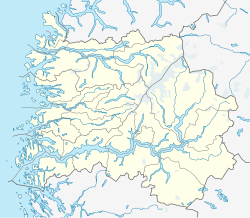Hopperstad stave church
| Hopperstad Stave Church | |
|---|---|
| Hopperstad stavkyrkje | |

View of the church
|
|
| 61°04′38″N 6°34′08″E / 61.0773°N 6.5689°ECoordinates: 61°04′38″N 6°34′08″E / 61.0773°N 6.5689°E | |
| Location |
Vik Municipality, Sogn og Fjordane |
| Country | Norway |
| Denomination | Church of Norway |
| Churchmanship | Evangelical Lutheran |
| Architecture | |
| Status | Historic Parish church |
| Functional status | Preserved |
| Architect(s) | Original architect unknown; 19th-century restoration by Peter Andreas Blix |
| Architectural type | Stave church |
| Style | Romanesque and Gothic |
| Completed | c. 1130 |
| Specifications | |
| Capacity | 30 |
| Materials | Wood |
| Administration | |
| Parish | Vik |
| Deanery | Indre Sogn prosti |
| Diocese | Diocese of Bjørgvin |
Hopperstad Stave Church (Norwegian: Hopperstad stavkyrkje) is a stave church, just outside the village of Vikøyri in Vik Municipality, Sogn og Fjordane county, Norway. The church is currently owned by the Society for the Preservation of Ancient Norwegian Monuments. The two old parishes of Hopperstad and Hove was abolished in 1875, and replaced by the new, united, Vik parish. The new Vik Church was finished in 1877, and the two middle age churches of Hopperstad and Hove have sice then been museum churches. Vik parish is a part of Indre Sogn deanery in the Diocese of Bjørgvin.
The stave church is assumed to have been built around the year 1130 and still stands at its original location. In 1997, a series of samples from the logs were collected for dendrochronological dating of the church. A total of seven samples produced an estimate for the construction ranging from 1034 to 1116 and resulted in no definite conclusion. The only possible conclusion is that this is one of the oldest stave churches still standing.
About 700 years after its construction the church was abandoned and its exterior stripped. The church was in very poor condition for many years until the Society for the Preservation of Ancient Norwegian Monuments purchased the building in 1880. Using the Borgund Stave Church as a model, architect Peter Andreas Blix reconstructed the church between 1884 and 1891. During the reconstruction carved sections were found beneath the floor which indicates that the new church replaced an older church, which was probably built in the latter half of the 11th century.
...
Wikipedia


